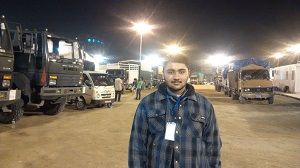Steve Jordan interviewed Sudeep Shah from Orient International Relocations about the day the earthquake hit.
It was about mid-day that the earthquake hit Nepal. Saturday, 25th April, a day of rest. Sudeep Shah from Orient International Relocations was planning a relaxing day with his wife and daughter in Kathmandu: a visit to the temple followed by lunch somewhere nice.
The earthquake registered 7.8 on the Richter scale. Its epicentre was just 80km north-west of Kathmandu and its hypocentre just 15 km deep, shallow by comparison to some and very destructive. Kathmandu moved 10ft to the south in 30 seconds. 10,000 people died; 23,000 were injured; hundreds of thousands were left homeless. It was the worst natural disaster in the country for over 80 years.
“Suddenly the house started shaking like a matchbox,” said Sudeep. “The windows were rattling, the doors were banging, people were screaming. A 200kg refrigerator moved five feet across the floor. I can’t describe the feeling. We were terrified. We thought it was the last moments of our lives.”

Sudeep had experienced earthquakes before but nothing like this one. “This was just like a bomb exploding,” he said. “It went on for about 45 seconds, but time seemed to stop.” Then came the aftershocks, some almost as strong as the main quake, that kept everyone outside the buildings for safety. “They just kept on coming.” Asked for how long they had continued Sudeep said that the last one had been only two days earlier: 8th July, over two months after the initial shock. And they continue.
“People were running on the streets trying to find out if everyone was OK and sometimes finding that someone had died,” said Sudeep. “About 1 km from my house was a 300ft-high victory monument. It fell on the city killing 250 people.”
Miraculously Sudeep and his family were physically unharmed and his house undamaged. His company too escaped without serious damage although everything had been thrown around the offices.
For a day the situation was very confused. Then Sudeep received a call from Care International (an international non-government organisation) saying that supplies were coming into the airport and that his help was needed. “There was only the Nepalese army at the airport; no customs people. We could only identify the flights by their call signs.”
But the aid came in from all over the world and Sudeep, his son Sudev and their crews worked tirelessly to distribute it to the people who needed it most. Normal business was on hold. There was no Internet or power for a week. Sudeep’s only connection to the world was his Blackberry which miraculously was functional and was charged by the car charger. All his trucks were switched to relief work. “We felt it was our duty to save our nation first,” he said. At the time of writing Orient International had already distributed 3,800 tonnes of building materials and essential supplies. The work continues.
 Inside the old city of Kathmandu there are still hundreds of people living in tents and everything is badly damaged. In the outlying villages the problem is worse. It’s the most mountainous region on earth. Relief work is slow. Now it’s started raining, roads are slippery, even tractors can’t get through, and the helicopters, provided by foreign governments at the height of the crisis, have returned to their bases.
Inside the old city of Kathmandu there are still hundreds of people living in tents and everything is badly damaged. In the outlying villages the problem is worse. It’s the most mountainous region on earth. Relief work is slow. Now it’s started raining, roads are slippery, even tractors can’t get through, and the helicopters, provided by foreign governments at the height of the crisis, have returned to their bases.
But for Sudeep and his men the work continues and he is very grateful for all the help that his country received from outside. “I must thank all of the volunteers and the governments who have come to Nepal to help,” he said. “They give their time and effort and put their lives in danger. They are still working here. I met many wonderful people from different countries. One, a Care volunteer from Lebanon, JA, worked 18 hours a day, he didn’t sleep. This is what motivates us. People trying to help without any monetary interest. We are really thankful to them.”
Asked what others can do to help now, Sudeep said that he believes that the bad time is over. “But we still need help to support the victims in the villages,” he said. “I ask that people continue to donate to the aid agencies such as Care, the Red Cross and Action Aid, because they will make sure the help gets to where it’s needed.” Beyond that Sudeep said that they needed nothing more than our good wishes.
Rebuilding Nepal will be a long process. It’s a beautiful but poor country that has been ruined by bad politics. But Sudeep has an important message for everyone that the disaster has brought into clear focus for him. “Despite all the terrible things that are happening in the world, natural or otherwise, I want you to know that humanity still prevails over trouble.”
May it always remain so. And on behalf of the rest of the global moving industry Sudeep, be assured, you have our good wishes.
Photos: Middle right: Sudeep with Bruno Gomez of the UN World Food Programme; bottom left: Sudeep's son Sudev, collecting from the airport at 2am.
Click here to see the next Editor's Pick